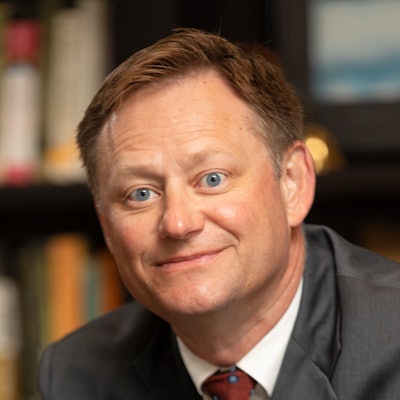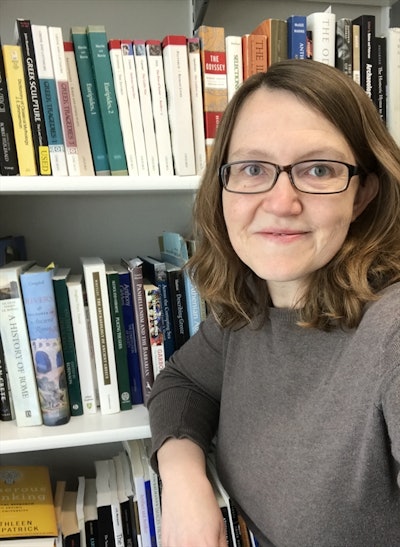In the wake of turmoil, Coe College addressed matters head on and made meaningful change.
Coe College in Cedar Rapids, Iowa, has consistently performed well across all four Diverse Organizational Impact and Transformation (DOIT) institutional pillars. A year ago, Coe was the only college or university to earn B or above on all four pillars. But during the 2021-22 academic year concerns about diversity in leadership surfaced. By summer, the college had taken decisive action — hiring Donald Jaamal to be dean of diversity, equity and inclusion (DEI) and Title IX coordinator.
“In these early days, I am acclimating myself to the institution, evaluating the campus climate, establishing relationships with faculty, staff and students, and becoming more connected with the local community,” says Jaamal. “Understanding the perspectives of Coe community members who have been affected by these issues has been invaluable.” David T. Hayes
David T. Hayes
Addressing matters directly
The challenges arose when a longtime trustee and Coe alum raised diversity-related concerns with the college’s presidential search. A dispute led to the resignation of two trustees. What followed were demands from Coe community members, including Coe's Black alumni. In addition to Jaamal’s hiring, there were requests for the creation of a committee to address discrimination, racism, diversity, and inclusion concerns.
Jaamal, who has worked in various positions in higher education for more than a decade, says listening was very important before starting to develop programming. “This role requires a high level of collaboration,” he says. “My purpose is to help the institution be more proactive about increasing collective awareness of institutional inequities so that we can promote systemic change with the involvement of both internal and community stakeholders.”
While Coe has had previous diversity officers, Jaamal operates in an expanded capacity, which is what students, faculty, and staff requested. He leads the DEI office, coordinates campuswide diversity initiatives, develops education and information sessions, and represents Coe’s DEI mission within the community and throughout higher education.
Coe College President David T. Hayes does not deny it has been a difficult time, but says the college is working to address each challenge. Having navigated the worst of the COVID-19 pandemic, he suggests the fall semester has been an uplifting time.
“There are still plenty of challenges and work to be done, but a college campus full of energy and vibrancy is truly a wonderful place to learn and grow,” says Hayes. “To have it fully back this year gives everyone a boost of joy and gratitude.”
A diversity, equity, and climate survey from the Higher Education Data Sharing Consortium is planned for the spring. “It aims to identify strengths and areas for improvement, as well as measure progress on key diversity, equity and inclusion initiatives in order to gain a better understanding of perceptions and experiences of students, faculty and staff,” Jaamal says.
With help from the Justice, Diversity, Equity and Inclusion student organization, the college expects to launch a diversity ambassador program to foster meaningful dialogue. The ambassadors will also help students recognize and respect cultural differences and similarities. There will be a civil rights tour during Spring Break and a visit to the George Floyd Global Memorial at the end of the spring semester.
“Additionally, we are working on the development of The Lowery Initiative to assist in retaining our young men of color and forming employee resource groups to assist in retaining our staff from diverse backgrounds,” says Jaamal.
Strategic planning
Coe is in the process of developing its newest strategic plan.
“While all other areas of focus are still on the table for negotiation, the only component that was agreed would be automatically included was the continued emphasis and growth of all DEI initiatives on campus,” says Dr. Angela Ziskowski, interim provost and dean of faculty at Coe. Dr. Angela Ziskowski
Dr. Angela Ziskowski
“All stakeholders have committed to DEI being an area of focus of the plan, as it was in our most recent five-year plan,” adds Hayes. “We’ve made progress with that approach, but it is my hope that this next plan allows Coe to bake these efforts into the very fabric of Coe, making it a part of our DNA that permeates through all policies, practices and culture of the college.”
There have been substantial changes to the board of trustees’ structure with faculty and student voting representatives added to all board committees to ensure that diverse voices are heard, Ziskowski explains. “We don’t assume that DEI happens in any one office of campus or that it can be distilled to specific programming or training,” she says. “Inclusion has to be part of our campus’ campus culture and ethos.”
Margaret LeMay, an assistant professor of English who teaches creative writing, says every individual in her class settings holds an equal seat at the table. “My classes reinforce that: a.) each person’s perceptions, vision, and voice are unique to them and their lived experience; b.) the blank page is blank for every writer, every time; and c.) as writers we do and should understand readings and foundational elements of writing anew as we go, grow and change,” says LeMay.
In her course design, readings, discussion structures, and content, LeMay says she incorporates a respectful tone and environment. All students complete a social identity wheel at the start of each term. This wheel asks questions about race, gender, pronouns, age, disability, socioeconomic status, religion, and sexual orientation. No student is required to answer any question with which he, she, or they are not comfortable. Students are invited but not required to share their answers with the class, and they turn their answers in to LeMay.
“Each person’s creative writing reflects their prior experience, exposures, and influences,” says LeMay. “Taking an equal seat at the table means that we listen to and respond to the writing of others with these facts in mind. We approach each piece of creative writing on its own terms, assuming that it may be speaking to aesthetics and terms that our own experience has not yet allowed us to learn or understand.”
Innovation
Additionally, Coe continues to develop and nurture community partnerships with businesses, organizations and other entities in the Cedar Rapids area.
Opened earlier this year, Coe College Center for Health and Society is an interdisciplinary/multi-disciplinary space for collaboration and conversation about health, wellness, environments and communities. It enables an intentional health focus across the liberal arts and facilitates dialogue on the future of healthcare. Coe students can explore careers in mental health and clinical healthcare. They also may choose to integrate health and care into other courses of study.
Across the college, a new general education curriculum has been approved and will start fall 2023.
“One exciting component — related but not officially a part of our new gen ed — that was voted in was a Diversity Across the Curriculum requirement,” says Ziskowski. “In addition, Coe will expand the Center for Health and Society, and I am confident the minor, health and society studies, will expand as will the opportunities that Coe has for students to work closely with professionals and organizations in the healthcare world.”
Although the campus community is together again, the mental health issues that students, faculty, and staff have dealt with since 2020 remain. In October, the college publicized a #NationalStressAwarenessDay social media campaign.
Hayes says the personal, social, political, and other pressures are undeniable and should be thoughtfully addressed.
“Coe has taken a number of steps to support our community, including programming around wellness and health, providing extra time off for staff to serve the larger community through a volunteer program, expansion of remote/flexible work options, and piloting a weekly free lunch in dining services for all employees,” Hayes says. “We try to stay laser-focused on our strategic imperative to make Coe a welcoming and supportive home for every student, faculty, and staff member who choose to live and work here.”















